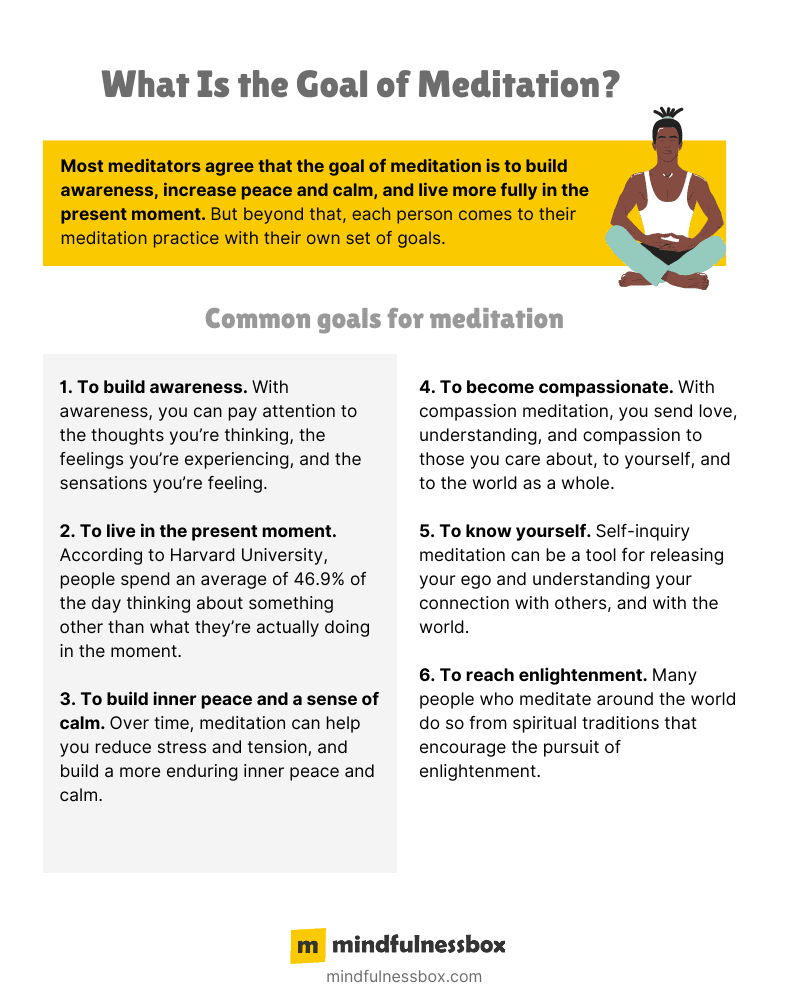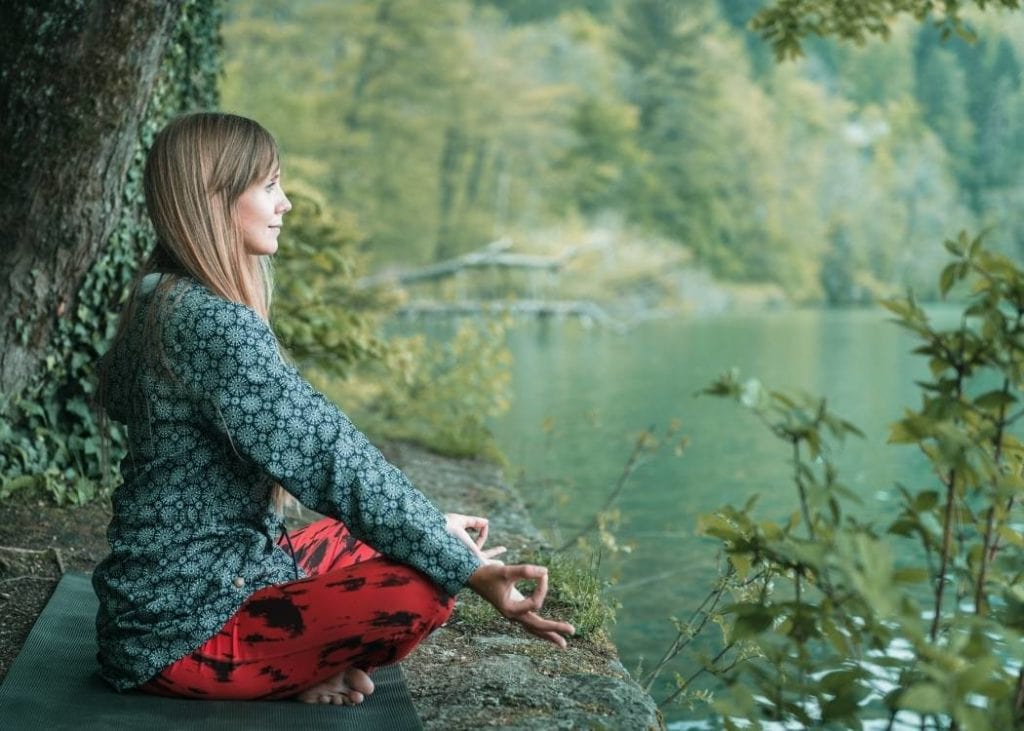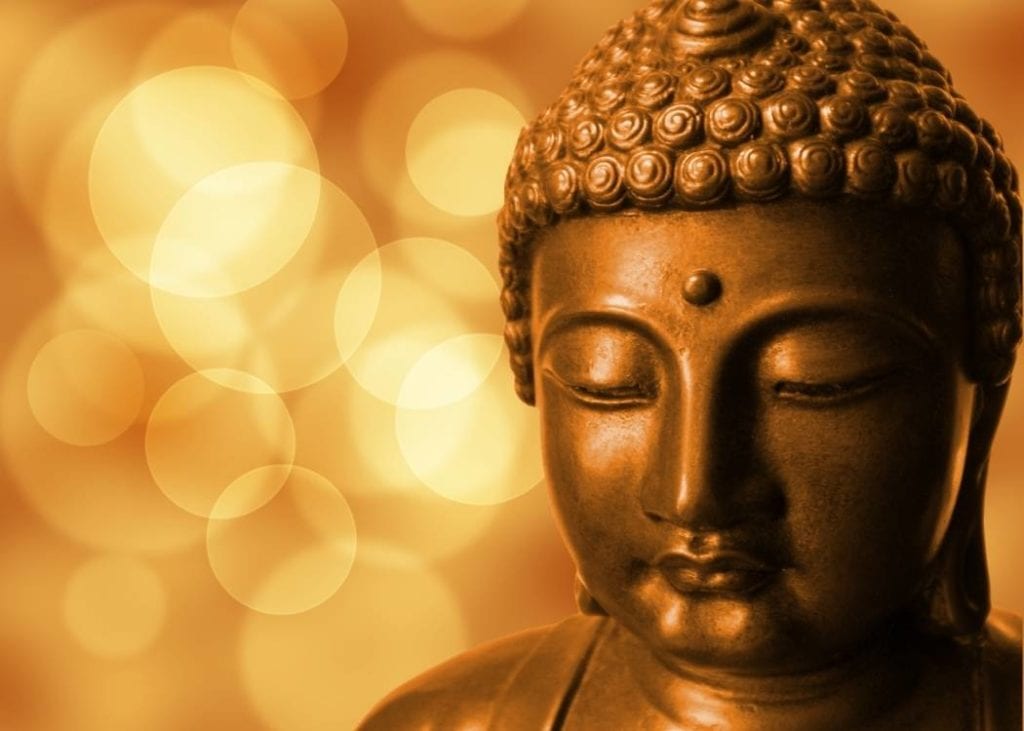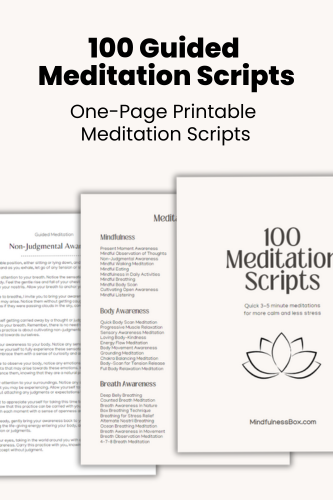What is the goal of meditation? Most meditators agree that the goal of meditation is to build awareness, increase peace and calm, and live more fully in the present moment. But beyond that, there’s a wide variety of answers. Each person comes to their meditation practice with their own set of goals.
I meditate primarily because I want more peace and calm in my life. I recognize the power of my mind to create tension, and practice meditation as a way to become aware when that’s happening, and release it.
These 100 meditation scripts were created to help beginner and intermediate meditators practice key mindfulness concepts like self-love, forgiveness, gratitude, and inner peace.
Designed to fit into busy schedules, each meditation script lasts 3-5 minutes. Perfect for starting or closing a group meditation; for yoga, coaching, or therapy sessions; or for your personal meditation practice.
But people have different reasons for practicing meditation.
- Some people just want a moment of relaxation in the middle of a hectic day.
- Some people practice self-inquiry meditation to shed their ego.
- Some people want to build their muscle of compassion.
- Some people are even seeking enlightenment.
- Some would even say that meditation shouldn’t have a goal.
Let’s explore the primary goals of meditation, as well as some other reasons you might explore this practice.
What is the goal of meditation?

Most of us come to meditation with a specific pain that we think meditation will alleviate. We want less tension, less stress, or a less busy mind. Then, we hear that the answer is meditation.
Here’s an easy trap to fall into:
After starting meditation, sometimes the goal subtly shifts. Without realizing it, your goal has become “to get better at meditation.”
But the goal of meditation isn’t to become excellent at the skill of sitting on a cushion for hours while breathing in a certain way.
Instead, it’s about the skills that come from that practice: skills like awareness, living in the present moment, and building peace.
1. To build awareness

First and foremost, meditation is a practice that helps you create more awareness.
With concentration meditation, you spend your session concentrating on your breathing or on an object. With free-floating awareness meditation, you spend time noticing the thoughts that pass by and gently releasing them.
In both styles, the skill of awareness is being cultivated. Before, you might not have noticed what you were thinking or when your attention was elsewhere. When meditating, you’re practicing awareness, and that practice extends into your daily life once your meditation session is over.
Without awareness, you can go through life without really experiencing it.
With awareness, you gain the ability to more reliably pay attention to the thoughts you’re thinking, the feelings you’re experiencing, and the sensations you’re feeling.
2. To live in the present moment

So many of us live in the past or the future, instead of the moment we’re actually in.
According to Harvard University, people spend an average of 46.9% of the day thinking about something other than what they’re actually doing in the moment.
Meditation can help you notice when you slip away from the present moment, and come back.
In fact, you’ll notice that’s exactly what you practice in a meditation session.
By bringing your attention back to the breath or back to the object of meditation you’re focusing on, you’re training yourself for more time in the present in daily life.
You’re working to get that 46.9% number lower, and your time in the present higher.
3. To build inner peace and a sense of calm

To be human is to experience tension and stress and difficult feelings. It’s part of how we’re wired.
We have complex minds with the ability to remember the past and make plans for the future.
This complexity is a gift, but it’s also a challenge. How do you quiet a busy mind? How do you reassure a mind obsessed with what may happen in the future? How do you nudge yourself back to the present moment when you’re worried about something you did in the past, or someone you may have hurt?
Meditation is an answer. Part of the practice of meditation is paying attention to thoughts nonjudgmentally. That means when thoughts arise about the past or the future, or people you may have hurt, you simply notice them. Then, release them, and come back to the present.
Over time, this practice can help you reduce stress and tension, and build a more enduring inner peace and calm.
4. To become compassionate

Loving-kindness meditation and self-compassion meditation are practices that help you experience compassion for yourself and others.
Holding compassion for others can be challenging, and being compassionate with ourselves is often even more so. We can be our own worst critics.
Research shows that compassion is a muscle. It can actually get stronger with training.
With compassion meditation, you send love, understanding, and compassion to those you care about, to yourself, and to the world as a whole.
The end result is that you strengthen your ability to default to compassion with yourself and others.
5. To know yourself

Self-inquiry meditation is about understanding yourself and who you really are.
Self-inquiry meditation typically starts with a question like “Who am I?” Asked over and over again, the question may disappear into the background and over time, you’re left with the core of your being.
The Buddha is said to have practiced self-inquiry meditation on his journey to understanding his identity as the eternal self.
Through self-inquiry, meditation can be a tool for releasing your ego and understanding your connection with others, and with the world.
6. To reach enlightenment

Many people who meditate around the world do so from spiritual traditions that encourage the pursuit of enlightenment.
In the Buddhist tradition, enlightenment is “a state of perfect knowledge or wisdom, combined with infinite compassion.”
According to Buddhist monk Matthieu Ricard, we operate under the illusion that we are a solid, autonomous entity, which leads us to make choices that satisfy the ego and lead to short-term pleasures.
Enlightenment is the end of suffering, and suffering ends by detachment from the ego.
What’s your purpose for meditating?
So, you’ve read through the many possible goals of meditation.
Certain principles of meditation are universal: awareness, for example, is a constant focus across all disciplines of meditation.
Beyond that, the reasons people come to meditation may be different.
Are you pursuing meditation to build a sense of peace and calm in your life? Are you trying to become more compassionate? Would you like to live more in the present moment? Or are you seeking to know yourself better, or even seek enlightenment?
Which intention you hold is entirely up to you.
Further reading
Learn more about meditation in the following articles:
- 51 Types of Meditation Practices
- What Does Meditation Feel Like?
- Why Is Meditation Important?
- The 5 Stages of Meditation (How to Build A Sustainable Practice)
Frequently asked questions
What is the purpose of meditation?
The purpose of meditation is to create a sense of nonjudgmental awareness in each moment and live more fully in the present moment. Meditation can also help you create an enhanced feeling of peace and calm in your daily life.
But beyond that, there’s a wide variety of answers, from strengthening your sense of compassion to pursuing self-knowledge to reaching enlightenment.
Each person comes to their meditation practice with their own set of goals.

My mindfulness practice kicked off in 2016 with a ten-day silent retreat. Since then, I’ve read dozens of books about mindfulness and completed hundreds of hours of meditation. Thinking about what makes humans happy, calm, and peaceful is endlessly fascinating to me.


